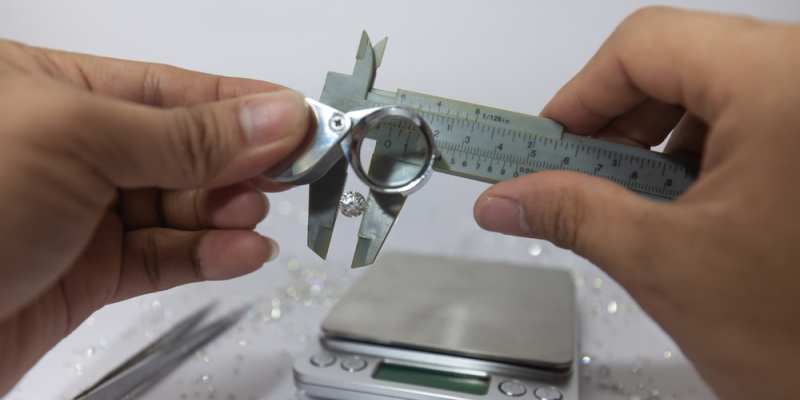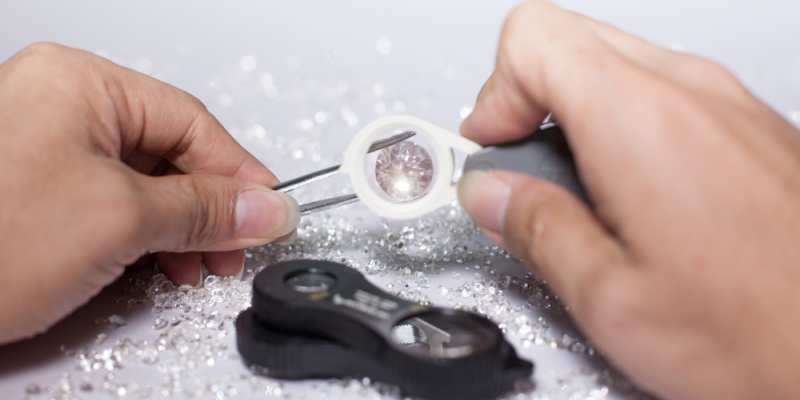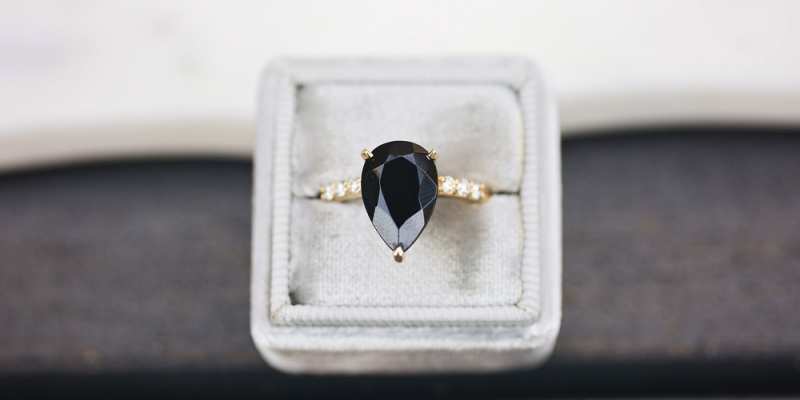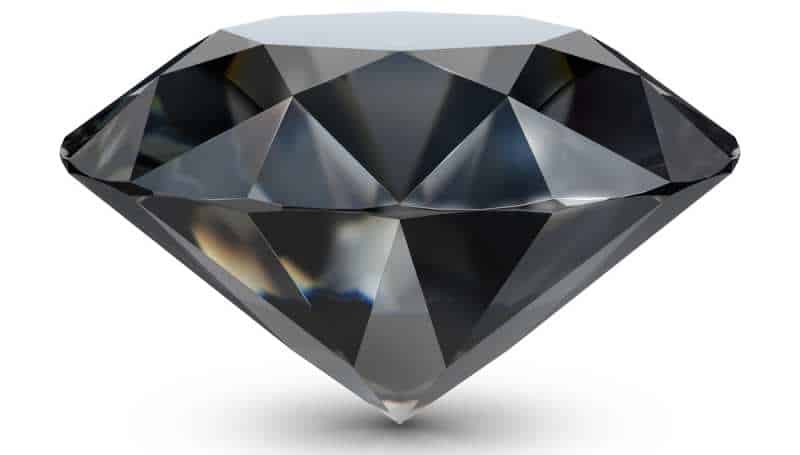Black diamonds have gained significant popularity in recent years as a unique choice for jewelry. While traditional white diamonds have long been cherished, black diamonds offer a distinct and alternative look that appeals to many individuals.
However, with this rise in popularity comes questions about the quality and authenticity of black diamonds. Are black diamonds genuine diamonds? Can they pass a diamond tester?
To uncover the answers, delve into the rest of our article.
DESIGN YOUR OWN ENGAGEMENT RING: START WITH A SETTING OR START WITH A DIAMOND. IT’S REALLY UP TO YOU!

What Are Black Diamonds?
White diamonds are well-known for being formed under intense pressure deep within the Earth. But what about black diamonds? Let’s explore the true nature of black diamonds.
Black diamonds, also known as Carbonados, occur naturally in their black coloration. They can be found exclusively in Brazil and certain parts of the Central African Republic. Remarkably, some of these diamonds were created approximately 3 billion years ago, making them one of the oldest substances on our planet.
It’s important to note that not all black diamonds are natural; some undergo treatments to enhance their black hue. This is because not all black diamonds start off completely black, often exhibiting shades of brown or gray. Treatments such as radiation or heat are applied to darken their color.
Interestingly, such treatments can be applied to any diamond, not just genuine Carbonados, making these diamonds remarkably resilient. Natural black diamonds have a polycrystalline structure, meaning they consist of multiple differently oriented crystals. Consequently, black diamonds tend to have a higher number of inclusions, yet they possess a unique luster compared to other diamonds.
Inclusions refer to tiny particles of other materials trapped within the gem. While black diamonds themselves are not prohibitively expensive, their cutting process is intricate and requires skilled jewelers experienced in handling these distinct gems.
Due to their pitted surface and numerous inclusions, enhanced black diamonds, which undergo heat treatment, may exhibit even more inclusions and surface cuts. It’s crucial to handle black diamonds with care as they are delicate and prone to breakage if not properly maintained.
The rising popularity of black diamonds can be attributed to the uniqueness they bring to engagement rings and other fine jewelry pieces. They offer an alternative and captivating option for those seeking something different.

Do Black Diamonds Pass The Diamond Tester?
Nowadays, diamond testers are readily available and affordable, allowing you to easily obtain one from various shops or online if you have gemstones that require testing.
These testers typically feature a needle on one end, which is used to determine the authenticity of a diamond. But how does it work?
The needle assesses thermal connectivity to provide an accurate result and determine whether the diamond is genuine or not.
To use a diamond tester, simply place the needle against the diamond and hold it there for a few moments. The tester will calculate the thermal connectivity levels, and if the readings are positive, it will indicate that the diamond is genuine.
Congratulations, your diamond is not fake!
Some diamond testers may display fluctuating levels on a meter, while others may only show a positive or negative result. Additionally, certain testers emit a sound to signal the end of the test, while others rely solely on the meter readings. These features vary depending on the model of the tester.
Regardless, the testing process is usually quick and straightforward.
While these devices are relatively accurate for testing white diamonds and similar gemstones, their effectiveness in detecting black diamonds is limited.
To be completely honest, black diamonds are unlikely to pass a diamond tester. In other words, it is challenging to obtain accurate readings with black diamonds, despite them being genuine gemstones.
Why is that?
The issue lies in the fact that diamond testers work best on transparent, white diamonds. On the other hand, black diamonds are opaque and do not reflect light as much as regular diamonds.
Due to their opacity, using a diamond tester, even on a certified black diamond, may indicate that the black diamond is not real. It may even suggest that the gemstone is moissanite, even though you know it is not.
This is because the thermal connectivity of the tester does not penetrate through black diamonds.
As a result, you’ll need to rely on alternative methods to confirm the authenticity of your black diamond and differentiate it from moissanite or cubic zirconia.
On that note, if the price of a black diamond seems too good to be true, it’s likely that the stone is not a genuine black diamond.

How To Check If The Black Diamond Is Real?
It is important to note that diamond testers usually do not work effectively on black diamonds, which can lead to potential mistakes and costly errors when relying solely on these devices to determine the authenticity of the gemstone.
As a result, many individuals may choose not to purchase black diamonds since the diamond tester may yield negative results or incorrectly indicate that the stone is moissanite.
Conversely, the diamond tester may incorrectly identify moissanite as a genuine diamond, further exacerbating the issue. While the performance of diamond testers varies depending on the type, most of them are not suitable for testing black diamonds. Therefore, seeking assistance from a professional is advisable.
To avoid investing hundreds or thousands of dollars in a stone of little value, it is recommended to visit a local jeweler or, ideally, a certified gemologist. However, caution is necessary when choosing a jeweler, especially smaller or lesser-known establishments, as their evaluation skills may be limited.
Many jewelers use regular diamond testers that examine light reflections within diamonds, a test that works effectively on white diamonds but not on black diamonds due to their opaque appearance. Consequently, jewelers may make the same mistake as an individual testing the diamond at home.
So, what is the best method for determining the authenticity of a black diamond? Surprisingly, it involves using sandpaper. This quick and easy method involves checking if the stone scratches with sandpaper. If a stone claimed to be a real diamond, but is actually moissanite, it will scratch. Conversely, a genuine black diamond, being incredibly strong and resilient, will remain unscathed by sandpaper.
When it comes to purchasing a genuine black diamond, it can be challenging, as many people only discover the need to verify authenticity after making the purchase.
To avoid unwittingly buying a fake diamond, it is crucial to steer clear of enticing deals from unknown or dubious online stores. Stick to well-known and reputable jewelry brands to ensure that you are not spending your savings on an engagement ring that is significantly undervalued.
While it is true that black diamonds are generally more affordable than their white counterparts due to their opaque nature and reduced light reflection, this does not always indicate that they are fake. However, it is important to purchase from stores with a strong reputation for selling authentic stones.
Genuine black diamonds should come with certificates that verify their origin and authenticity. If you have purchased a black diamond and still want to verify its authenticity, take the time to find a reputable gemologist or jeweler who is knowledgeable about black diamonds. Some jewelers may not be aware that traditional diamond testers are ineffective for testing black diamonds and may provide inaccurate results.

Are Black Diamonds And Black Moissanite The Same?
At first glance, black moissanite and genuine black diamonds may appear identical. However, upon closer examination, it becomes clear that they are entirely different gemstones.
Black diamonds are naturally found in their black state, while moissanite is predominantly synthetic. This distinction makes moissanite appear flawless, without any inclusions or cuts, and it reflects light perfectly. In contrast, black diamonds exhibit variations in color, cuts, and luster, giving them a more authentic look.
Black diamonds often have imperfections, and it is rare to find a completely pitch-black diamond. Moreover, even if a perfect black diamond is found, it tends to be priced closer to white diamonds, making it more expensive. To address this, moissanite was created to imitate black diamonds at a more affordable cost.
So, what exactly is moissanite? It is a genuine stone, albeit extremely rare in nature. Initially mistaken for a diamond due to its resemblance, further examination revealed that moissanite is actually gem-quality silicon carbide, distinct from a diamond in various aspects.
Scientists later discovered that moissanite could be produced in laboratories, leading to mass production of the gemstone. One significant concern with moissanite is its ability to pass standard diamond testers. Being lab-grown, moissanite was specifically created to resemble genuine gemstones, allowing it to easily deceive diamond testers.
This poses a considerable risk for those who believe they have found a black diamond at a low price, only for it to pass a diamond tester as moissanite.
Our official advice is to not rely on diamond testers when it comes to black diamonds, as they can lead to significant mistakes. Instead, it is crucial to have the stone examined by a certified jeweler or professional before making a purchase.
Additionally, it is always wise to purchase jewelry from reputable stores that provide the necessary certificates for authenticity.
Sometimes, distinguishing between moissanite and black diamonds can be challenging, and only professionals can reliably identify the difference.
Therefore, when it comes to assessing these gemstones, it is best to trust the expertise of the professionals.

Bottom Line
In summary, black diamonds do not pass the diamond tester. While the diamond tester is a handy device, it is designed to work specifically with white diamonds. When it comes to black diamonds and other colored diamonds, relying on the diamond tester can yield inaccurate results, potentially causing unnecessary anxiety for those with limited knowledge about diamonds.
To ensure a smooth buying experience and avoid unpleasant surprises, it is advisable to purchase black diamonds from reputable and licensed dealers. It is important to remember that only a skilled jeweler or gemologist can accurately determine the authenticity of a black diamond, as the diamond tester is not suitable for this purpose.


